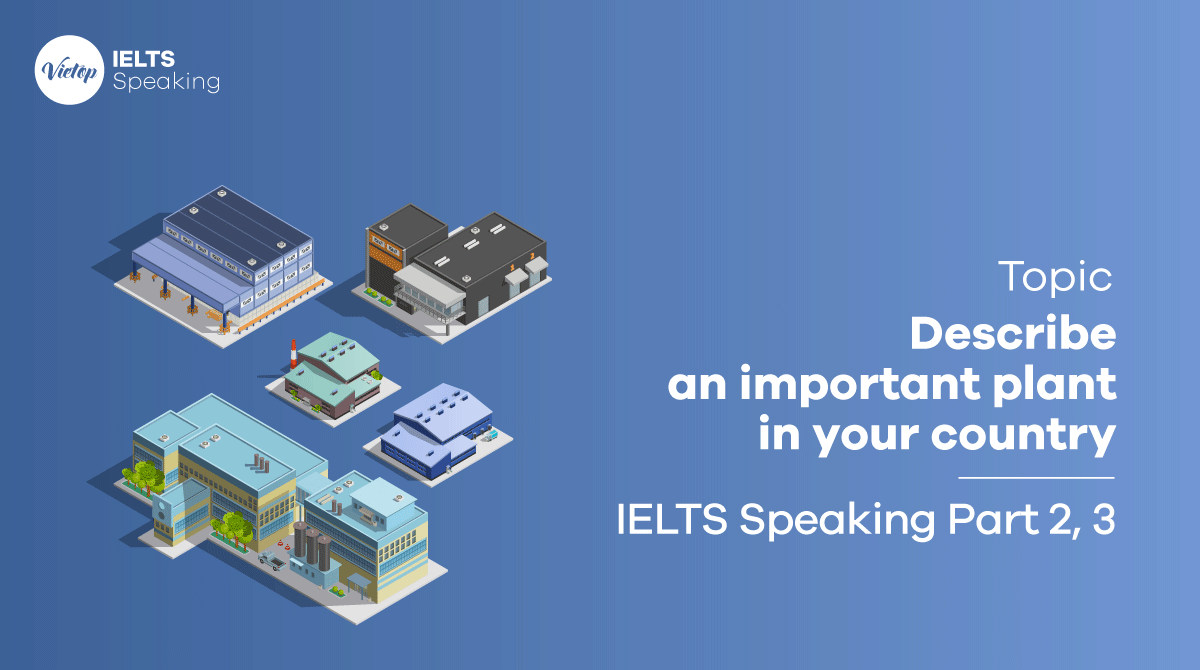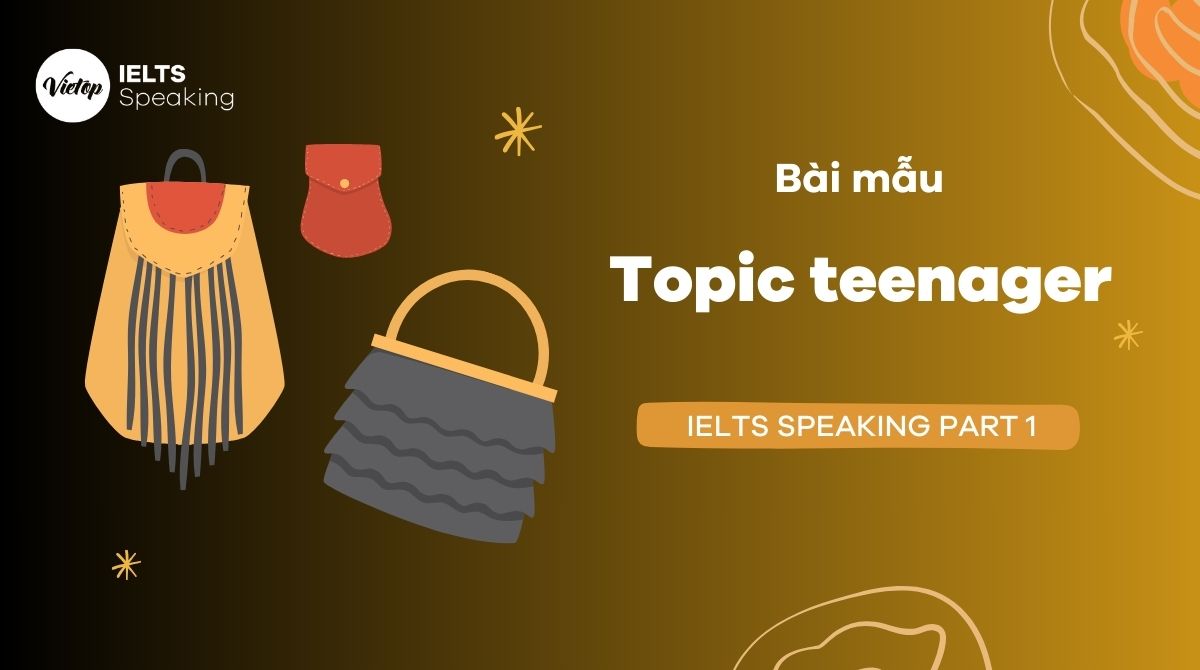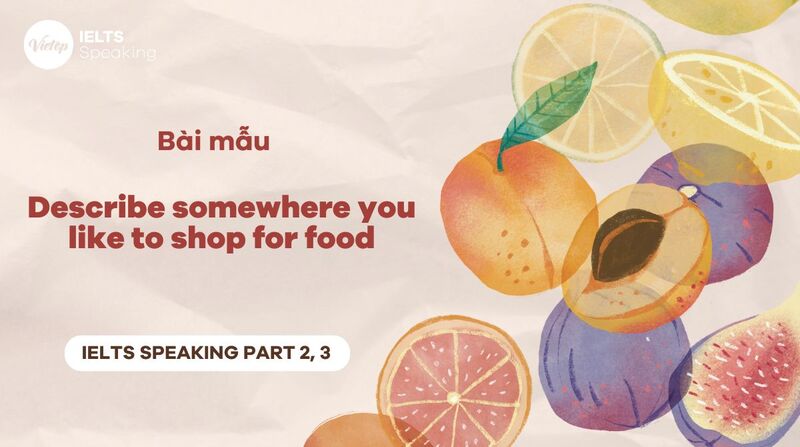Describe an important plant in your country là chủ đề quen thuộc trong đề thi IELTS Speaking, yêu cầu thí sinh miêu tả một loại cây quan trọng ở đất nước mình. Với chủ đề này, thí sinh cần nắm chắc được ngữ pháp và bộ từ vựng liên quan đến cây cối. Hôm nay Vietop sẽ cung cấp cho bạn IELTS Speaking Part, Part 3 Sample: Describe an important plant in your country nhé!
IELTS Speaking Part 2 sample: Describe an important plant in your country

Phân tích đề bài
| Describe an important plant in your country. You should say: What it is What it looks like Where and how it is grown/ Where it is found Why you like or dislike it And explain why it is important. |
Để giải quyết dạng đề bài này, thí sinh cần bám sát vào các câu hỏi đề xuất mà đề bài đưa ra, cung cấp những thông tin mạch lạc, rõ ràng. Bên cạnh đó, thí sinh cũng có thể khai thác theo hướng dạng bài Event, kể về một chuyến đi vô tình gặp được loại cây đó và tiếp tục khai thác.
Cách tiếp cận này là cách để bạn đa dạng về mặt từ vựng, tuy nhiên không thực sự phù hợp với những ai có năng lực ngôn ngữ chưa được tốt.
Mở đầu bài nói, thí sinh cần làm rõ loại cây đó là cây gì. Vì Việt Nam là một nước có nông nghiệp phát triển, nên đây là một câu hỏi khá dễ trả lời. Ngoài những loại cây truyền thống, thí sinh có thể lựa chọn những loại cây thông dụng, gần gũi với giới trẻ hiện nay như cây ca cao, cây cà phê,…
Tiếp đến, thí sinh cần đi sâu hơn vào hình dáng cây và được trồng ở khu vực nào. Nếu bạn không rõ khu vực trồng của loại cây đó, bạn có thể kể về địa điểm bạn thấy loại cây ấy. Để đạt điểm cao hơn, thay vì chia sẻ đơn thuần các thông tin về loại cây ấy, bạn có thể phân tích rõ hơn về mặt lịch sử, nguồn gốc của loài cây này có từ bao giờ.
Cuối cùng, thí sinh cần nói rõ bản thân thích hay không thích loại cây đó và giải thích tại sao loại cây đó đóng vai trò quan trọng trong đời sống ở Việt Nam. Hãy dành nhiều thời gian cho câu hỏi này vì đây là phần quan trọng nhất để thể hiện khả năng nói của mình. Có thể lồng ghép các lợi ích của loại cây đó mang lại cho bản thân hoặc kinh tế nước nhà.
Xem ngay: Cách phát âm ed trong tiếng Anh chuẩn nhất
Mời bạn cùng nghe Podcast bài mẫu Part 2 của Vietop English nhé:
IELTS Speaking Part 2 Sample
Well, as rice is the most significant agricultural crop in my nation, I’d want to talk about it.
The rice plant has been discussed in practically every topic since I was in early elementary school, including literature, natural science, and geography. The rice plant can be seen growing everywhere in the Vietnamese countryside, even in real life.
I’m constantly in awe of how such a basic plant can support the economy of an entire country. Millions of Vietnamese families still rely on the production of rice to supplement their income today. More convincing evidence of the importance of this plant in my nation is shown by the fact that Vietnam is now among the top exporters of rice in the world.
In addition, children develop the habit of eating rice from a very early age, and the elder generation cannot spend a day without rice in some way. Rice has been an essential component of the primary meal of most families for millennia.
The rice plant has been a particularly significant part of Vietnamese culture for thousands of years, and many ceremonies and traditions have their roots in the farmers’ aspirations for a bountiful harvest. Many of these traditions are regarded as important, well-established customs by tourists from other countries.
I believe that the rice plant has evolved into one of the most significant representations of the Vietnamese spirit and is deserving of high praise from all eras.
Bạn có khao khát nâng cao khả năng giao tiếp tiếng Anh của mình một cách hiệu quả và đầy tự tin không? Trước tiên bạn cần làm được các dạng bài IELTS speaking part 2, 3 với chủ đề Describe an important plant in your country. Để làm được các dạng bài này bạn cần có những kỹ năng như đọc, viết, nghe và nói. Có phải bạn đang lo lắng khi các dạng bài này quá khó khôn. Đừng do, đã có Vietop.
Với khoá học IELTS tại Vietop English. Bạn sẽ nang cao kiến thức tiếng anh của bạn từ cơ bản lên nâng cao một cách dễ dàng và nhanh chóng. Ngoài ra, khắc sâu kiến thức ngữ pháp quan trọng để nâng cao kỹ năng nói và viết trong kỳ thi IELTS, phát âm chuẩn xác, dễ nghe, và tự tin khi diễn đạt. Sẵn sàng mạnh dạn thể hiện những chủ điểm cơ bản một cách rõ ràng và hiệu quả. Vì vậy, hãy tham gia luyện thi IELTS tại Vietop. Đăng ký ngay.
Vocabulary Highlights
- Agricultural crop (n): cây nông nghiệp
- Elementary school (n): trường tiểu học
- Literature (n): văn học
- Natural science (n): khoa học tự nhiên
- Geography (n): địa lý
- In awe of: sợ hãi
- Supplement (v/n): bổ sung
- The top exporters (n): các nhà xuất khẩu hàng đầu
- Ceremony (n): nghi lễ
- Have sb’s roots in: có nguồn gốc trong
- Bountiful (adj): phong phú
- Representation (n): đại diện
Xem thêm:
IELTS Speaking Part 3 sample: Describe an important plant in your country

Mời bạn cùng nghe Podcast bài mẫu Part 3 của Vietop English nhé:
What plants are important to the economy in your country?
In addition to rice, I believe that coffee is also a tree worth mentioning because of how important it is to Vietnam’s economic development. That stated, coffee has developed into the top export sector that supports our economy and is the leading producer of robusta beans worldwide. According to what I’ve read, the revenue from coffee exports is even expected to grow quickly in the near future because Vietnamese farmers can now sustainably grow and even process high-quality beans. Looking forward to seeing our labels everywhere in the world!
- Robusta beans (n): đậu Robusta
- Revenue (n): doanh thu
- Label (n): nhãn hàng
Is it common for people to have gardens in your country?
Although concrete jungles are more prevalent than ever these days, I would still answer in the affirmative since gardens not only provide visual interest to the whole property but also act as a therapeutic hobby for the owner. Whether it’s a tube house in a busy street or an apartment on the 20th floor, I have a tendency to believe that Vietnamese always want to make their home as pleasant as possible.
In those situations, a cozy area surrounded by vegetation would work well. In addition to having gardens for aesthetic reasons, I think Vietnamese also have them for fun, especially since gardening is already a type of contemporary meditation that helps us shut ourselves off from the outside world for a bit.
- Concrete jungles (n): rừng bê tông
- Prevalent (adj)): thịnh hành
- Affirmative (n: khẳng định
- Property (n): tài sản
- Therapeutic hobby: thú vui trị liệu
- Tube house (n): nhà ống
- Vegetation (n): thảm thực vật
- Aesthetic (adj): thẩm mỹ
- Contemporary meditation: thiền đương đại
- Shut oneself off: tự tách bản thân khỏi
How can people be encouraged to grow their own food?
It is challenging, but not impossible, to convince city inhabitants to start growing their own food as they become more reliant on shops. I believe there should be some incentives initially, some extrinsic motivation to start with, to encourage these folks to use their green thumb and plant crops around their homes.
It would be fantastic if the local government could set up some harvesting competitions, perhaps by distributing tomato seedlings to each home and judging whose family can get the most out of them. By gradually fostering competition among adults (which is characteristic of urban residents), I think this also piques children’s curiosity. These folks might stop shopping at convenience stores once they comprehend and become accustomed to having fruit and vegetables readily available at the back of their home.
- Reliant (adj): dựa dẫm
- Incentives (n): sự ưu đãi
- Extrinsic (n): bên ngoài
- Green thumb (n): kỹ thuật trồng cây
- Tomato seedlings (n): cây giống cà chua
- Pique (v): khiêu khích
Xem thêm bài mẫu Speaking:
- Bài mẫu topic Environment – IELTS Speaking Part 1, 2, 3
- Bài mẫu topic work and study – IELTS Speaking part 1
- Bài mẫu topic Morning time – IELTS Speaking part 1
Hy vọng rằng qua bài viết này, bạn đã có thêm vốn từ vựng cũng như cấu trúc sử dụng cho dạng đề bài Describe an important plant in your country. Bên cạnh về chủ đề IELTS Speaking Part 2, Part 3 Sample: Describe an important plant in your country, bạn cũng có thể tham khảo thêm một số chủ đề khác thường hay gặp trong IELTS Speaking Part 2, Part 3 ở Vietop. Chúc bạn chinh phục IELTS thành công!
Luyện tập IELTS Speaking với bài mẫu IELTS Speaking part 2 và IELTS Speaking part 3 nhé!









